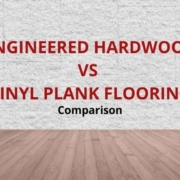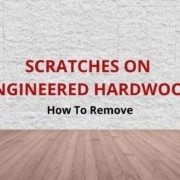Advantages & Disadvantages of Engineered Wood Flooring
Engineered hardwood floors happen to be a relatively recent invention compared to solid hardwood surfaces.
They came into use about a decade after the Second World War when solid hardwood was largely replaced by linoleum floors due to the rising popularity of concrete slabs.
This development meant that manufacturers had to come up with flooring which was especially stable and more resistant to moisture and temperature fluctuations than solid hardwood, resulting in the invention of engineered hardwood. If you are unfamiliar with engineered wood, we recommend reading our article on what is engineered wood flooring.
In this article, we examine the pros & cons of engineered hardwood flooring. Also, we provide detailed comparisons to solid hardwood and laminate flooring.
Advantages of Engineered Wood Floors
In appearance, engineered wooden floors are rather similar to solid hardwood floors. However, they typically consist of three main layers with the uppermost being made of hardwood.
The presence of hardwood in a single layer is what differentiates it from solid hardwood and laminate flooring as the former is completely made of hardwood, and the latter possesses a photographic layer that provides the appearance of a hardwood surface.
Below, we have listed the main advantages of installing engineered hardwood floors as opposed to their solid wood and laminate counterparts.
1. Adding Value to Your Property
Like solid hardwood flooring, engineered wooden floors can also raise the value of your property. Laminate flooring on the other hand is not as highly valued despite being preferred to carpeting or vinyl, and may even reduce the value of a property if the variety installed happens to be especially cheap.
2. Cost (Compared to Solid Hardwood Flooring)
Engineered hardwood flooring can often be a cheaper option since manufacturers often only use the most expensive wood for the veneer.
This is in direct contrast to solid wood in which the entire plank has to be made from the variety of wood being used resulting in its being more expensive.
The former costs between $4 to $10 per square foot, while the latter costs between $5 to $15 per square foot.
3. Durability (Compared to Laminate Flooring)
Engineered hardwood floors generally have a lifespan of 20 to 40 years, and it is even possible for some of them to last longer. Laminate floors, on the other hand, generally last a maximum of 20 years.
4. Ease of Installation (Compared to Solid Hardwood Floors)
Engineered hardwood flooring is generally considered easy to install and this procedure can be done by an amateur particularly if they happen to be using planks that can be click-locked. What’s more, it is often sold prefinished, reducing the amount of work you will have to do to prepare it for your home.
Solid hardwood floors, on the other hand, are somewhat more difficult to install. They may also be sold unfinished in which case you will need to sand, stain, and apply a finish to your floor once you have installed it.
5. Esthetic Appeal
Engineered hardwood flooring is capable of providing the esthetic appeal of solid hardwood surfaces. As a result, you can enjoy the same ambiance of sophistication the latter option provides when installing the former. Because it is also available in a wide range of colors and finishes you will also have a variety to choose from to match your preferred style for your home.
Although laminate flooring also provides an extensive range of choices with regard to color and style, it is visibly different from real wood despite being able to resemble it to a certain degree.
6. Hygiene
Engineered hardwood flooring will not trap any debris, dander or unpleasant floors in the same way carpet might, making it ideal for pets.
It also does not conceal plenty of bacteria or parasites either but can be cleaned instantly unlike carpeting which may not only contain the above but be difficult to clean as well.
As a result, it is an ideal option if you or any members of your household are affected by any allergies.
7. Plank Size
If you prefer wider planks, engineered wood would be a better option for you since these boards are often wider compared to those of solid hardwood and can reach sizes of 7 inches, as opposed to the latter which often have a maximum width of 4 inches.
8. Stability and Moisture Resistance
Engineered hardwood floors consist of a veneer, a core, and a base layer. The core is made up of layers of wood that are placed at right angles to each other and certain high-quality products may have as many as seven or even twelve layers.
This arrangement lends engineered hardwood floors a great degree of stability, making them less prone to warping in the presence of moisture.
Solid hardwood floors, on the other hand, are made of one single block of wood and as a result, are less stable in this regard.
This means that they are more prone to crowning, cupping, and gapping due to being more susceptible to humidity.
9. Sustainability
Because only their topmost parts need to be made from solid wood, engineered hardwood floors generally require less wood (up to a third less) compared to solid hardwood floors.
Engineered hardwood flooring comes with a dense core and is also a better conductor of heat as a result. Installing it means you are likely to have to spend less energy to keep your home warm than you would if you opted for solid hardwood floors.
10. Variety of Installing Options
Engineered hardwood flooring can come with either click systems or tongue and groove systems. In the case of the former, you will be able to install a floating floor which you will be able to take with you when you move to a new home, saving money as a result.
It is also ideal for installing over a variety of subfloors including concrete, particleboard, terrazzo, tile, wood, and vinyl.
On the other hand, solid hardwood flooring can only be installed by gluing or nailing down. It is impossible to install it as a floating surface.
It is also worth noting that it may only be used for concrete subfloors when being installed above grade. Also, we recommend reading our article that talks in detail about how to install engineered hardwood over concrete.
Disadvantages of Engineered Wood Floors
The style, esthetic appeal, versatility, and ease of installation engineered hardwood floors possess means they can be an excellent option under certain circumstances. However, they also come with several drawbacks compared to solid hardwood and laminate flooring. Some of the most common disadvantages of this flooring option include:
1. Acoustics
Compared to engineered hardwood, solid hardwood possesses better acoustic properties due to its ability to reduce echoes. It can also distribute sound within a space and prevent reverberations more effectively due to its greater density and hardness.
2. Cost (Compared to Laminate Flooring)
Although engineered hardwood flooring can be less expensive than solid hardwood flooring it is more expensive compared to laminate flooring.
(Engineering hardwood ranges from $4 – $10 per square foot, while laminate flooring ranges from $0.50 – $5.)
3. Ease of Installation (Compared to Laminate Flooring)
Although engineered hardwood floors can be installed by amateurs and are easier to install compared to solid hardwood floors, the installation of laminate flooring is a significantly easier process, owing to the ability of its planks to lock onto each other.
As a result, it is highly popular among amateur decorators, and choosing it may enable you to save both time and money.
4. Ease of Repair
Damage to engineered hardwood can be difficult to repair and it may be necessary for the entire flooring surface to be replaced.
With solid hardwood, you will be able to rematch the floor if only a part of it is damaged before proceeding to refinish the entire surface. Solid hardwood is also ideal for use during remodeling projects when partitions may be removed making it necessary to add more wood.
5. Ease of Refinishing
Engineered hardwood flooring is generally unsuitable for refinishing. As a result, you will not be able to sand it and apply a protective finish.
The only exceptions are products that come with veneers above 2 mm in thickness and certain premium varieties which can be refinished as many times as hardwood floors.
6. Overall Durability
Despite their robustness and resistance to gapping, cupping, and crowning, engineered hardwood floors generally last between 20 to 40 years.
Solid hardwood floors on the other hand are capable of lasting for up to a century.
7. Susceptibility to Moisture
Despite their ability to handle humidity better than solid hardwood surfaces, engineered hardwood floors can still be damaged by water and every effort should be taken to protect them from spills as a result.
On the other hand, water-resistant laminate floors are capable of handling exposure to moisture better although they are by no means waterproof.
8. Susceptibility to Scratching and Dents
Despite its toughness, engineered hardwood flooring remains susceptible to scratches and dents, making it unsuitable for high-traffic areas. It is also worth noting that it may be impossible to remove deep gouges and scratches in it, unlike solid hardwood floors.
Laminate flooring, on the other hand, is less susceptible to these issues making it a possibly better option as a result.
9. Susceptibility to Sunlight
Like solid hardwood, engineered hardwood is photosensitive and will fade or even darken when it is exposed to sunlight. Most of this discoloration will be caused by UV light, although infrared light can also cause fading as well.
We suggest using light-colored woods in rooms exposed to plenty of sunlight or installing flooring to which a protective coating has been applied.
Alternatively, they also suggest the use of drapes to protect your floors or even UV filtering film fitted on your windows. The latter option will enable you to block infrared rays in addition to filtering UV light and even enable temperature regulation indoors with a possible reduction of your energy bills. Low-E coated glass could also prove beneficial.
Laminate flooring is more resistant in this regard as several varieties come with UV inhibitors. That said they will still fade eventually over time.
10. Toxicity
Even though its manufacturing process reduces waste, engineered hardwood flooring comes with a glued core. This adhesive may contain certain harmful products, unlike solid hardwood flooring which is completely natural.
Solid Wood Flooring vs. Engineered Wood Flooring
Solid hardwood has been in use for far longer than any other wooden flooring option including engineered wood flooring which was introduced in the 1960s. And as can be seen from the pros and cons of engineered hardwood flooring noted above, both options have their strengths and weaknesses despite their similar appearance. Below they are examined in light of scenarios you are likely to encounter as a homeowner.
Installation Above/Below Grade
Solid hardwood floors: Surfaces in this category are especially susceptible to moisture. As a result, they are unsuitable for installing in rooms below ground level, such as your basement, for example. Doing so will place them at risk of warping and swelling and also encourage the presence of mold and mildew.
However, it is worth noting that these planks may be installed in rooms above ground level since these spaces are less susceptible to water damage than rooms below grade.
Engineered hardwood floors: Being less susceptible to moisture, these floors can be installed below ground level. They can also be installed above grade like their solid hardwood counterparts.
Radiant Floor Heating
Solid hardwood floors: Surfaces in this category are especially susceptible to changes in temperature. Using them in rooms in which radiant heating is used could make them lose their moisture content and dry out.
Engineered hardwood floors: They are more resistant to changes in temperature and less prone to shrinkage as a result. This makes them a suitable option and ideal for use in rooms warmed by radiant heating.
Installation in Your Kitchen/Bathroom
Solid hardwood floors: Given the porous nature of wood, surfaces in this category are unsuitable for rooms where a great deal of water is used as doing so will place them at risk of damage.
Engineered hardwood floors: Despite being less prone to moisture damage, engineered hardwood floors are by no means waterproof. As a result, they are not suitable either for use in these rooms.
The best options would be ceramic tile or vinyl.
Verdict
Engineered hardwood flooring offers a wide range of benefits that make it ideal for your home. These include that authentic natural sophistication associated with wood, better acoustics compared to laminate flooring, and improved air quality and durability – qualities that all enable it to add to the value of your home.
There is also the fact that it possesses greater stability and resistance to temperature and moisture, and can be installed on concrete, above and below grade as well.
The option to also install it as a floating floor is also an important benefit since it can enable you to save on costs providing you with the option of taking it with you when you move to your new home.
However, it does have its drawbacks as well, such as poorer acoustic qualities, the difficulty involved in repairing it compared to solid hardwood, and less resistance to wear and sunlight compared to laminate flooring.
Yet, there is no doubt that its growing popularity shows the widespread appeal of a sustainable option that is just as authentic in terms of being made from real wood like solid hardwood.
Table of Contents





